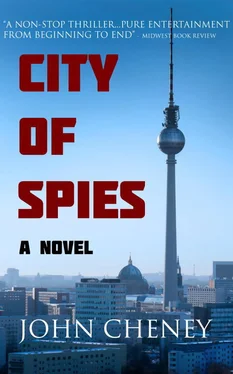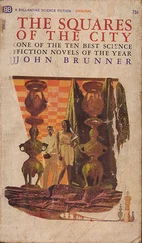Müller watched through the large glass windows at the front of the Palace as Hans fled across the parking lot and over the Palace Bridge. Now there was the approaching sound of police sirens. A caravan of police cars flew past the Palace, their blue lights flashing as they followed in pursuit. Müller watched as Hans took a hard left on Oberwallstrasse, just past the old Prussian Crown Prince’s Palace. A new series of blue lights now came from the right, near the New Guard House. Two more police cars joined the pursuit. The dissonant tones of the sirens combined to a cacophony of distress. Hans had a good head start, but the army of pursuers was growing by the minute.
Müller ran to the nearest empty conference room and picked up a phone. He called a contact that he had kept secret for nearly forty years. No one, including Hans, knew of the tightly-guarded relationship between Müller and this western agent. Müller met the man a year after the war had ended, and as their friendship had grown, they developed a back-channel of communications during emergencies such as now.
“Yes?” a voice answered in an unrushed yet vigilant tone.
“Our mutual friend is in imminent danger,” Müller said. “They’re on to him now. He’s made a run for it.”
“Where is he heading?”
“He hasn’t many options. More than likely he’s headed for the gate to nowhere.”
There was the slightest pause, one of understanding. The voice on the other line now spoke with urgency. “Thank you.”
The phone clicked dead. Müller prayed Hans would have just enough room to maneuver.
The milk truck slowly making its way through Dahlewitz was more than six hours’ early on its route, though none of the village’s sleeping citizens would be stirred to notice. Hidden in the normally refrigerated box on the back of the truck was a high-tech mobile outpost. Two soldiers sat at an array of knobs and screens, tracking radio burst signals with headphones. They had the most advanced equipment to intercept every military and encrypted signal. This special team had been given orders just 20 minutes ago to investigate possible radio traffic in Blankenfelde, when they tracked a series of short bursts coming from Dahlewitz to the south. The team raced to the village to try and locate the precise location of the transmissions. The senior technician called to the driver through a small window screen between the box and the cab. “We’re getting close. Take the next road to the left.”
In the farmhouse, less than half a mile away, Thorwald oversaw his invasion. One of his radio technicians reported the latest news. “Signals Corps reports successful jamming of enemy communications, Comrade General.”
“Very good.” Thorwald was pleased. Surprise would be their greatest asset.
“Sector I ground forces are now in position,” another radioman reported.
Thorwald’s officers watched from the threshold of the room. “Goodness,” one general said to another, “if I had known sneaking up on the Amis would be this easy, I would have pushed for this long ago.”
Hans throttled the motorcycle’s engine as he darted through narrow alleyways and around buildings. The cobblestone sidewalks and streets were damp with the night air, and Hans pushed the motorcycle’s thick tires to their limit as he sped away from the pursuing police. He was not far from Checkpoint Charlie, some eight city blocks to the south, but he knew he could not head there. Attempting to break through the checkpoint, with its large vehicle barriers and plethora of armed guards, would be suicide. Hans was also convinced he could no longer retreat into the East; even with Mason’s help, there would be no escape from the ever-closing net of Stasi and People’s Police. He had to make his escape now, and he knew only one place where he could even try. It would be dangerous enough, possibly even suicidal. But Hans knew, having inspected every inch of the Wall in his duties as liaison, that it was the one place where the Wall could be climbed. Hans turned the motorcycle east and made his way along Französische Strasse. If necessary, he would zig-zag his way along side streets and between buildings to avoid the police. Hans headed toward the Brandenburg Gate.
Inside the mobile radio tracking unit, one of the technicians shouted, “I’ve got it! We’re almost on top of them—it’s got to be within 500 feet!”
The driver peered through the darkness and saw the lights of the farmhouse at the edge of the woods. “That’s it.”
The driver pulled over and turned off his headlights. “Give word to teams A and B,” the driver said to the other technician. While the man began to send a message out, the first technician located all radio signals from the farmhouse and began jamming them.
The helicopter was already airborne and only minutes away from Dahlewitz when the call came. In the rear of the craft, eight soldiers sat and armed their weapons. They were part of the Defense Minister’s elite team that would track down and arrest the STOSS conspirators. Another team would be joining them on the ground. The objective was clear: surround the building, neutralize the threat, and use force if necessary. The soldiers were prepared for any eventuality, but were ordered to take Thorwald and his generals alive, if possible.
“Three minutes,” the co-pilot called out to the troops. The helicopter accelerated as it flew south over Blankenfelde.
Thorwald’s radio team was in a state of confusion. They could not tell if their equipment had suffered a power failure or a momentary lapse in signal transmission and reception. The most senior technician had seen many glitches before, but not a total equipment failure. Now all they were getting was electronic snow.
Thorwald was growing irate. “We’re only minutes away!” he shouted at the technicians. “I have units waiting for my order to start breaching the border installations!” He paced the room, his calm and collected veneer melting away. “Solve this, now!”
The three Antonov An-26 planes were now above the city, two minutes from West Berlin airspace. The Mi-8 helicopters had moved into position with them, and they were now broken off into groups heading for each of the Allied airports. In the back of each transport, the paratroopers anxiously awaited the signal to go. Suddenly, a message came through to the cockpit of each of the transports on the emergency band.
The pilot of the lead plane heading toward Tempelhof frowned. “Are you getting this?” he radioed to the pilot of the closest chopper.
“Abort,” the helicopter pilot confirmed. “I can’t believe it. We’re this close. Somebody must have caught wind of our coming.”
In the rear of each transport, the troops felt their aircraft bank unexpectedly as they turned away.
Down on the ground, the motorized and infantry units were receiving the same order to abort. The top field commander of the 1st Motorized Rifles tried to call Thorwald’s headquarters, but received no response. As the emergency message relayed over and over, it was adjusted with greater detail. The order was coming direct from Strausberg, from the Minister of Defense and Honecker himself. As the commanders began to pull back, some were dejected. Others began to rehearse the defense they would have to give for their actions, pleading they were duped into following orders they believed came from Honecker himself. In this case, it was better to plead stupidity than criminal intent.
Sergeant Koch received word from Captain Loeffler that an order had been issued to abort the invasion immediately. Word had been sent via radio to all troops. Koch realized the trains would most likely not receive the message, riding underground without wired communication. The communicator in the engineer’s booth at the front of the train was a civilian transmitter, and it would only operate on a restricted bandwidth.
Читать дальше












